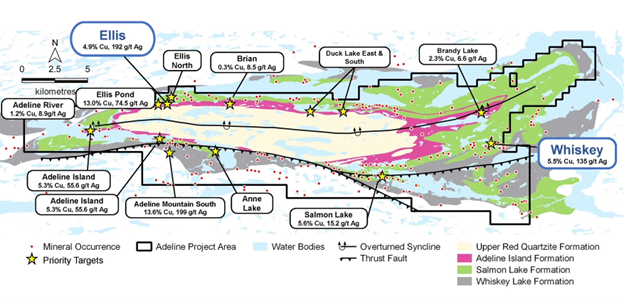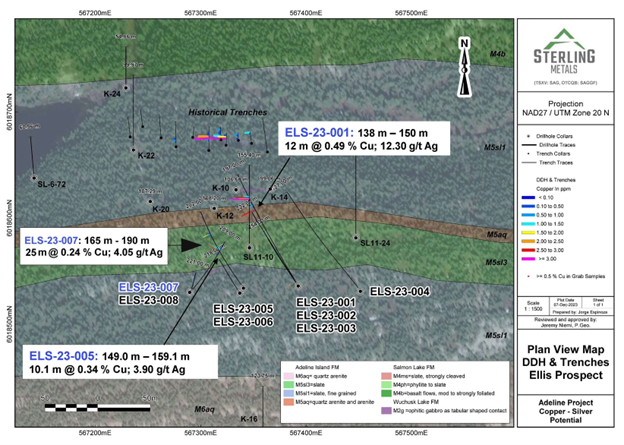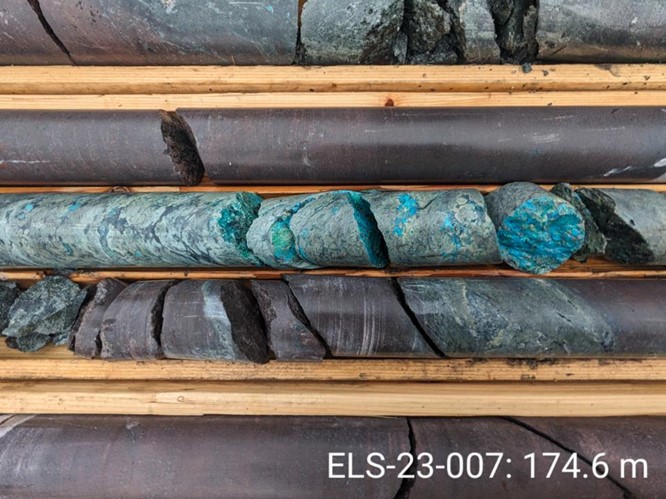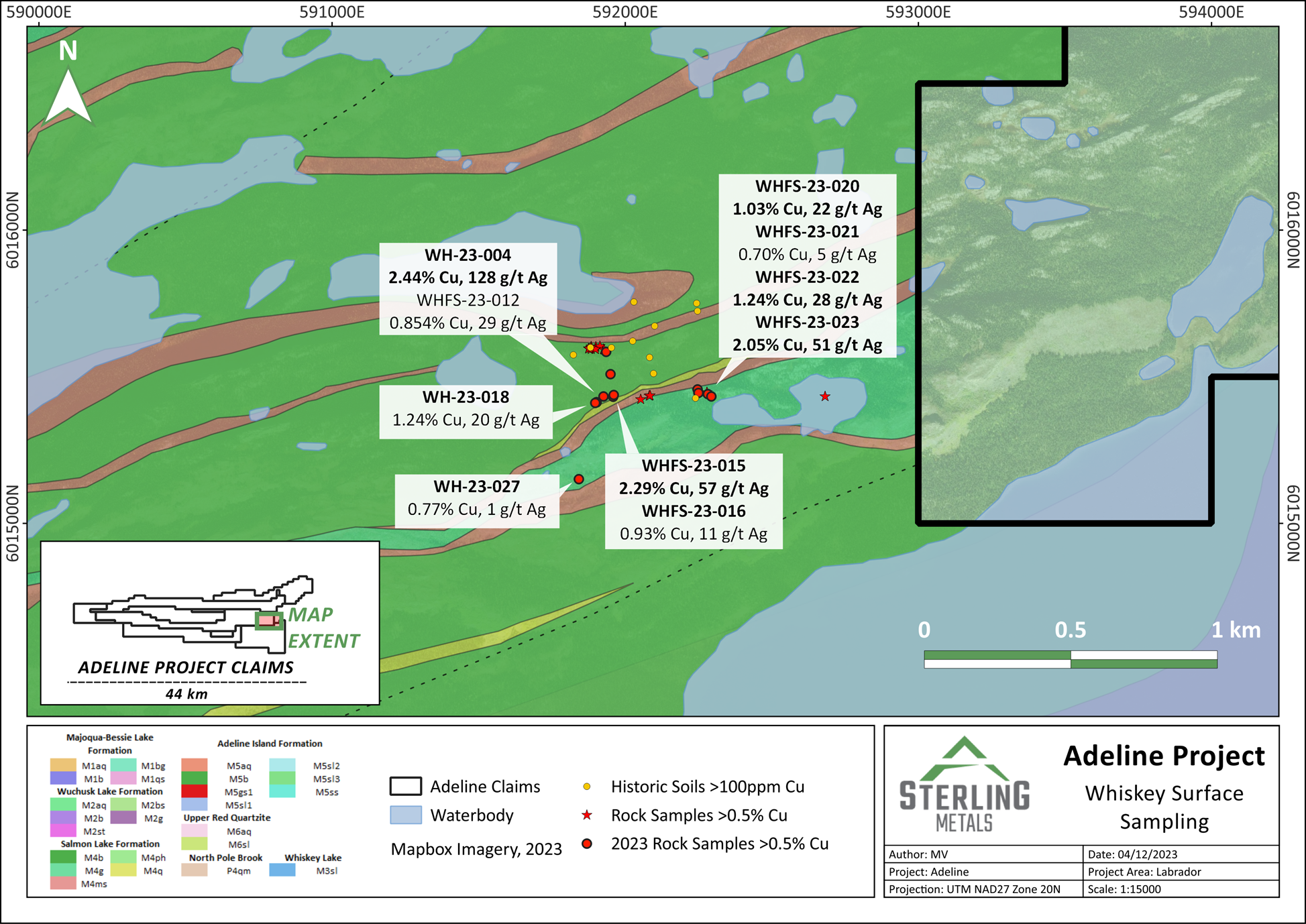Sterling Metals Announces Initial Assay Results from the Adeline Project, Labrador
December 8, 2023 – Toronto, Ontario – Sterling Metals Corp. (TSXV: SAG, OTCQB: SAGGF) (“Sterling Metals” or the “Company”) is pleased to report assay results from its inaugural drilling on the Adeline project (“Adeline” or the “Project”) in Labrador Canada. A total of 1,930 meters of drilling was completed in 11 drill holes focused on testing the Ellis Main prospect (“Ellis”) and the Whiskey target. In addition to the drilling campaign, the Company completed a surface sampling program from outcrops in the Whiskey area.
Highlights
- Inaugural drilling across the 44km x 7km basin tested two initial targets on opposite ends of the basin, with 10 of 11 holes intersecting copper mineralization, underscoring the robustness of the system (Figure 1)
- At Ellis, 8 holes tested the historic mineralized grey bed at depth and along strike with the following results as shown in Figure 2:
- ELS-23-007 intersected an extensive copper zone over a 150m by 100m area, with 25m @ 0.24% Cu and 4.05 g/t Ag, including 2.6m @ 0.87% Cu and 11.54 g/t Ag
- While the grey bed unexpectedly thinned, drilling intersection a mafic sill, a rock type differing from initial expectations, though typical in systems of this nature
- Notably, visuals confirmed 6 copper minerals across this 25m wide zone with extensive copper oxides suggesting potential at depth of sulphide accumulations
- At Whiskey located 25km east of Ellis, 3 holes showed pinching of the grey bed with narrower mineralization including:
- WHS-23-010 intersected 3.1m @ 0.96% Cu and 11.78 g/t Ag, including 0.7m @ 3.54% Cu and 46 g/t Ag
- WHS-23-011 which intersected 2.1m @ 1.20% Cu and 16.43 g/t Ag and 0.6m @ 3.22% Cu and 46 g/t Ag
- Additionally, encouraging sampling of outcrops south of drilling in the Whiskey area showed additional emerging copper trends on the eastern portion of the basin with 17 samples grading higher than 0.5% Cu and up to 2.44% Cu
- Camp was winterized prior to demobilization and a drill remains on site for a potential winter program
Mathew Wilson, CEO, stated, “The discovery of a big metal district requires a big metal system, which is exactly what we have at Adeline. The macro environment for copper remains very promising and even more so here at home in Canada. Our aim is to establish a copper project capable of putting Canada back on the copper map and this is just the first step. We are currently evaluating the data to identify a clear path to targeting both at Ellis and across the entirety of the 44km x 7km system. With over $4 million in the treasury, we are confident our systematic approach to targeting will result in an efficient and successful program when we return to drill at Adeline.”
Jeremy Niemi, SVP Exploration and Evaluation, commented, "The extent of the mineralization encountered in this inaugural program serves as a clear indication that there is much more to Ellis than we have seen so far – let alone across the entirety of this project. We went into this program to test a single previously developed target looking to establish the continuity of mineralized grey beds and a potential large hydrothermal breccia zone which we hoped would correlate with the IP survey conducted in the 90’s. While the grey beds did not continue at Ellis and the IP did not correlate to a large breccia zone, hole 7 did establish itself as having potential to represent the top of a flow breccia. The native copper in quartz veins and rock type are similar to the zones in the Keewenawan peninsula which provided a large source of copper for the U.S. in the 1900s. The grades and style of mineralization suggest we are potentially in proximity stronger copper zone. We are focused on refining our targeting approach to zero in on large accumulations of copper sulphide mineralization both at depth and to the south at Ellis, and across the property, to increase the probability of future drilling success and targeting.”
2023 Adeline Drilling Program
The Company’s 2023 Adeline drill program (Figures 1 and 2) (See Tables 1 and 2 for full results and drill hole locations) was designed to test both the extents of the mineralized grey beds at Ellis at depth and along strike as well as a potential blowout of the copper mineralization interpreted from the model of historical IP carried out on the project. In the first 3 holes it became clear that the grey bed mineralization observed on surface and in historical drill core, had disappeared and appeared to be replaced by a mafic sill. The top surface of the mafic sill was mineralized with copper oxide and native copper.
Copper mineralization was intersected in the tops of mafic flows in veined and brecciated rocks. This prompted the Company to adjust the angle of the last two holes at the target and approach the mineralization from a new perspective. Hole ELS-23-007 intersected a relatively wide zone of copper oxide mineralization which extended beyond fractures as observed in the initial holes. This was thought to potentially be the top of a flow breccia. Hole ELS-23-008 was an attempt to follow this mineralization to the south along the structure and towards historic conductors but deviated to the north and hit the edge of the oxide/sulfide zone, intercepting native copper in quartz veins.
Additionally, the copper zone identified in drilling was not consistent with the IP anomaly identified by Noranda from the 90’s. The Company is currently carrying out physical properties on the core, especially the rocks above the copper zone, to identify potential alternative sources of the chargeability response shown in the IP survey. There is extensive hematite mineralization and this may be responsible for the large target area shown in the chargeability response.

Figure 1. Plan map showing of the Adeline Project

Figure 2. Plan map showing 2023 Adeline Project drilling at Ellis target

Figure 3. Copper mineralization in hole ELS-23-007 showing extensive chrysocolla with malachite
The final three holes of the program were drilled at the Whiskey target, approximately 25km east of the Ellis target. The drilling was designed to undercut copper mineralization within grey beds at a historical trench. Drilling showed that the grey bed appeared to pinch resulting in narrower intersections than observed in the trench. Holes WHS-23-010 and WHS-23-011 intersected 3.54% and 3.22% copper of approximately 0.6m which were haloed by lower grade mineralization of 1-2m wide.
Table 1. Reported assay intervals from 2023 Adeline drilling
| Target | Hole Number | From (m) |
To
(m) |
Length (m) |
Cu
(%) |
Ag (g/t) |
| Ellis | ELS-23-001 | 138.0 | 150.0 | 12.0 | 0.49 | 12.30 |
| including | 138.0 | 139.8 | 1.8 | 2.02 | 67.00 | |
| ELS-23-002 | 157.7 | 159.9 | 2.3 | 0.22 | 1.23 | |
| and | 197.7 | 200.6 | 2.9 | 0.13 | 1.00 | |
| ELS-23-003 | 25.6 | 27.0 | 1.5 | 0.80 | 26.55 | |
| and | 164.8 | 166.5 | 1.8 | 0.67 | 9.62 | |
| ELS-23-003 | 176.5 | 179.2 | 2.8 | 0.11 | 1.90 | |
| ELS-23-004 | no significant mineralization | |||||
| ELS-23-005 | 149.0 | 159.1 | 10.1 | 0.34 | 3.90 | |
| including | 155.0 | 159.1 | 4.1 | 0.60 | 7.05 | |
| and | 191.5 | 192.6 | 1.1 | 0.18 | 1.29 | |
| ELS-23-006 | 177.7 | 180.0 | 2.3 | 0.09 | 1.94 | |
| and | 185.2 | 190.3 | 5.2 | 0.33 | 1.58 | |
| and | 203.0 | 205.0 | 2.0 | 0.14 | 1.00 | |
| ELS-23-007 | 165.0 | 190.0 | 25.0 | 0.24 | 4.05 | |
| including | 180.9 | 183.5 | 2.6 | 0.87 | 11.54 | |
| ELS-23-008 | 181.7 | 184.0 | 2.3 | 0.15 | 4.89 | |
| and | 186.5 | 187.0 | 0.5 | |||
| ELS-23-008 | 205.7 | 207.6 | 1.8 | 0.14 | 0.63 | |
| Whiskey | WHS-23-009 | 10.2 | 14.0 | 3.8 | 0.35 | 6.64 |
| WHS-23-010 | 7.0 | 10.1 | 3.1 | 0.96 | 11.78 | |
| including | 7.7 | 8.3 | 0.7 | 3.54 | 46.00 | |
| WHS-23-011 | 6.5 | 8.6 | 2.1 | 1.20 | 16.43 | |
| including | 7.4 | 8.0 | 0.6 | 3.22 | 46.00 | |
- See Figure 2 and Table 2 for drill hole locations.
- All reported depths and intervals are drill hole depths and intervals unless otherwise noted, and do not represent true thicknesses, which have yet to be determined.
Table 2. Reported 2023 Adeline hole locations and directions
| Hole number | Depth (m) | Azimuth | Dip | Easting | Northing | Elevation |
| ELS-23-001 | 197 | 330 | -55 | 567387 | 6018554 | 380 |
| ELS-23-002 | 222 | 330 | -70 | 567387 | 6018554 | 380 |
| ELS-23-003 | 254.33 | 330 | -80 | 567387 | 6018554 | 380 |
| ELS-23-004 | 227 | 330 | -61 | 567452 | 6018531 | 390 |
| ELS-23-005 | 202 | 330 | -70 | 567344 | 6018531 | 379 |
| ELS-23-006 | 218 | 330 | -82 | 567344 | 6018531 | 379 |
| ELS-23-007 | 209 | 45 | -75 | 567299 | 6018540 | 355 |
| ELS-23-008 | 221 | 45 | -86 | 567299 | 6018540 | 355 |
| WHS-23-009 | 59 | 330 | 50 | 591901 | 6015582 | 375 |
| WHS-23-010 | 49 | 330 | -65 | 591901 | 6015582 | 375 |
| WHS-23-011 | 73 | 323 | -80 | 591901 | 6015582 | 375 |
Whiskey Area Sampling Program
In addition to the drilling program, the Company collected a total of 34 outcrop surface samples at the Whiskey target area (See Table 3 for full results). 17 of the samples graded higher than 0.5% copper and the range of values was between 0.002% Cu and 2.44% (See Figure 6). The samples were taken mostly to the south of the Whiskey drilling along additional emerging copper trends. In many cases the sample locations were taken along the historical IP grid and coincident with chargeability anomalies that came to surface.

Figure 4. Surface sample locations and results at Whiskey target
Table 3. Reported 2023 Adeline Sample Results
| Sample ID | Easting (m) | Northing (m) | Elevation (m) | Cu (%) | Ag (g/t) |
| WHFS-23-002 | 591950 | 6015509 | 389 | 0.51 | 2.0 |
| WHFS-23-003 | 591935 | 6015585 | 384 | 0.64 | 16.0 |
| WHFS-23-004A | 591902 | 6015413 | 387 | 1.63 | 200.0 |
| WHFS-23-004B | 591902 | 6015413 | 387 | 2.44 | 128.0 |
| WHFS-23-004C | 591902 | 6015413 | 387 | 0.64 | 38.0 |
| WHFS-23-004D | 591902 | 6015413 | 387 | 1.04 | 36.0 |
| WHFS-23-004E | 591902 | 6015413 | 387 | 1.09 | 183.0 |
| WHFS-23-004F | 591902 | 6015413 | 387 | 0.41 | 14.0 |
| WHFS-23-004G | 591902 | 6015413 | 387 | 1.99 | 75.0 |
| WHFS-23-005 | 592020 | 6015434 | 372 | 0.01 | 2.0 |
| WHFS-23-006 | 592018 | 6015427 | 373 | 0.02 | 0.5 |
| WHFS-23-007 | 591884 | 6015412 | 380 | 0.20 | 14.0 |
| WHFS-23-008 | 591865 | 6015394 | 377 | 0.00 | 0.5 |
| WHFS-23-009 | 591835 | 6015400 | 380 | 0.01 | 0.5 |
| WHFS-23-010 | 591882 | 6015352 | 379 | 0.01 | 1.0 |
| WHFS-23-012A | 591898 | 6015411 | 385 | 0.27 | 13.0 |
| WHFS-23-012B | 591898 | 6015411 | 385 | 0.85 | 29.0 |
| WHFS-23-013A | 591896 | 6015414 | 383 | 0.25 | 18.0 |
| WHFS-23-013B | 591896 | 6015414 | 383 | 0.32 | 18.0 |
| WHFS-23-014 | 591957 | 6015431 | 395 | 0.49 | 9.0 |
| WHFS-23-015 | 591959 | 6015432 | 396 | 2.29 | 57.0 |
| WHFS-23-016 | 591961 | 6015438 | 397 | 0.93 | 11.0 |
| WHFS-23-017 | 591765 | 6015423 | 382 | 0.01 | 0.5 |
| WHFS-23-018 | 591926 | 6015433 | 380 | 1.24 | 20.0 |
| WHFS-23-019 | 592033 | 6015525 | 382 | 0.01 | 0.5 |
| WHFS-23-020 | 592247 | 6015457 | 359 | 1.03 | 22.0 |
| WHFS-23-021 | 592250 | 6015445 | 357 | 0.70 | 5.0 |
| WHFS-23-022 | 592282 | 6015441 | 352 | 1.24 | 28.0 |
| WHFS-23-023 | 592294 | 6015433 | 348 | 2.05 | 51.0 |
| WHFS-23-024 | 591947 | 6015441 | 372 | 0.30 | 11.0 |
| WHFS-23-025 | 591874 | 6015331 | 383 | 0.01 | 0.5 |
| WHFS-23-027A | 591842 | 6015151 | 381 | 0.77 | 1.0 |
| WHFS-23-027B | 591842 | 6015151 | 381 | 0.00 | 0.5 |
| WHFS-23-027C | 591831 | 6015149 | 382 | 0.09 | 1.0 |
Next Steps
The Company is undertaking a number of exploration activities to extract further value from both recent drilling and historical data. Additional analytical work is underway to examine the role of hydrocarbons within the sedimentary rocks in triggering the accumulation of copper mineralization. Analysis of non-carbonate sources of carbon is the initial step and will be followed by a hyperspectral analysis of historical holes for the presence of hydrocarbons across the property. Hydrocarbons in the sediments would be part of a favourable copper mineralization setting and open the opportunity to scan the entire property for new target areas with satellite data. The Company anticipates undertaking an advanced hyperspectral study using shortwave infrared channels to map favourable rocks and to bring new target areas across the property forward.
Currently, the field team is carrying out a physical property study on Sterling Metals 2023 core and historical core available in the Newfoundland and Labrador core library in Goose Bay. Measurements of magnetic susceptibility, gravity, resistivity, chargeability, and conductivity are being made on mineralized and non-mineralized drill core to aid in geophysical modeling and in designing future work programs.
Additionally, interpretation of the data from a DIGHEM airborne EM survey flown in 1992 for Noranda Exploration is underway. The survey identified numerous weak and moderate conductors and Sterling is modelling the conductors, which is expected to allow the team to characterize and rank each conductor. The team will prioritize conductors along favourable regional structures, within ideal host rocks and where copper occurrences have been identified nearby. This study will lead to sites which should be visited in the next exploration campaign for groundwork in 2024.
About the Adeline Project, Labrador
Comprised of roughly 30,000 hectares and a 44 km strike of copper-silver-rich terrain, Adeline covers the youngest middle Mesoproterozoic volcano-sedimentary sequences, known as the Seal Lake Group. The Seal Lake Group consists of supracrustal argillaceous and arenaceous sedimentary rocks, intercalated with basalt flows and intruded by gabbro sills. The volcano-sedimentary rocks formed as a result of extensive continental sedimentation from the transition from subaerial to shallow-marine during a rift-related cycle of uplift and erosions.
While sediment-hosted stratiform copper deposits are widespread, economically significant occurrences are infrequent. These deposits contribute to roughly 20 percent of global copper production and known reserves. Supergiant and giant deposits are formed in basins that experienced extended periods of fluid flow, where specific conditions facilitated the accumulation of substantial quantities of metal-rich fluid, ample reduced sulfur, and significant amounts of reductants.
Quality Assurance/Quality Control – Sampling Procedures
All drill holes are diamond drill core with NQ diameter. Drill core is delivered by helicopter to the Sterling Metals Seal Lake secure camp and core logging site. All core is photographed, logged, and sampled by the Sterling Metals exploration team. After detailed logging and photographs are taken, the boxes to be sampled are secured to the core box lid, and flown by float plane to Goose Bay, where they are received by Sterling Metals personnel and brought to the secure core facility. Drill core was halved by sawing with a diamond saw blade and half-core samples were placed in pre-labelled clear sample bags with a unique sample ID tag, sealed with a zip tie, and then placed into rice bags sealed with security tags and securely stored until shipped by commercial transport to the ALS Geochemistry core preparation facility in Montreal, Quebec. ALS Geochemistry is an accredited laboratory certified under ISO 17025 Standard.
For samples not containing native copper:
Preparation for these samples involves crushing them until 70% successfully pass through a 2mm sieve, followed by the generation of a 250-gram sub-sample split using a riffle splitter. The remaining material is further processed to achieve an 85% passing rate through a 75µm sieve. Subsequently, the samples undergo analysis using Inductively Coupled Plasma - Atomic Emission Spectroscopy (ICP-AES), which provides a comprehensive understanding of sample composition with a suite of 48 elements included in the ICP package. Sample digestion is carried out using a specialized 4-acid mixture, with a 0.4g aliquot. This method allows for the measurement of copper concentrations of up to 100,000 ppm and silver concentrations of up to 200 ppm, which would prompt overlimit analysis.
For samples containing native copper:
Preparation for these samples involves crushing them until 70% successfully pass through a 2mm sieve, followed by the generation of a 1,000-gram sub-sample split using a riffle splitter. Subsequently, the entire 1,000-gram sub-sample undergoes screen metallic copper analysis. The minus fraction is then sent for ICP analysis to determine the full suite of 48-element concentrations.
A crushed marble blank, a certified OREAS copper standard, and a core duplicate are systematically inserted into the sample analysis process. Furthermore, an extra blank sample is included immediately after any native copper samples. Analysis of the QAQC results is performed upon receipt from the laboratory, along with analysis of ALS’s internal QAQC results, including pulp and reject duplicates.
Qualified Person
Jeremy Niemi, P.Geo., Senior Vice President, Exploration and Evaluation for Sterling Metals has reviewed and approved the technical information presented herein.
About Sterling Metals
Sterling Metals (TSXV: SAG and OTCQB: SAGGF) is a mineral exploration company focused on large scale and high-grade Canadian exploration opportunities. The Company is advancing the Adeline Project in Labrador which covers an entire sediment-hosted copper belt, with demonstrated potential for important new copper discoveries with significant silver credits, and the Sail Pond Project in Newfoundland.
For more information, please contact:
Sterling Metals Corp.
Mathew Wilson, CEO and Director
Tel: (416) 643-3887
Email: [email protected]
Website: www.sterlingmetals.ca
Neither the TSX Venture Exchange nor its Regulation Services Provider (as that term is defined in the policies of the TSX Venture Exchange) accepts responsibility for the adequacy or accuracy of this release.
This news release contains certain “forward-looking information” within the meaning of applicable securities laws. Forward looking information is frequently characterized by words such as “plan”, “expect”, “project”, “intend”, “believe”, “anticipate”, “estimate”, “may”, “will”, “would”, “potential”, “proposed” and other similar words, or statements that certain events or conditions “may” or “will” occur. These statements are only predictions. Forward-looking information is based on the opinions and estimates of management at the date the information is provided and is subject to a variety of risks and uncertainties and other factors that could cause actual events or results to differ materially from those projected in the forward-looking information. For a description of the risks and uncertainties facing the Company and its business and affairs, readers should refer to the Company’s Management’s Discussion and Analysis. The Company undertakes no obligation to update forward-looking information if circumstances or management’s estimates or opinions should change, unless required by law. The reader is cautioned not to place undue reliance on forward-looking information.

